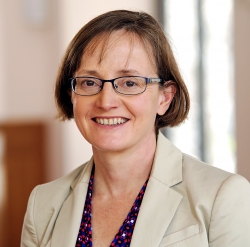By Julia Schwarz

Margaret Martonosi, an expert in power-efficient computer architecture, has been awarded the Frances E. Allen Award for Outstanding Mentoring from the Association of Computing Machinery (ACM).
Martonosi, the Hugh Trumbull Adams ’35 Professor of Computer Science, was recognized for her outstanding and far-reaching mentoring in computer architecture and the broader computer science community.
A member of the Princeton faculty since 1994, Martonosi has advised the dissertation research of 36 Ph.D. students, mentored scores of undergraduates and hosted many summer research interns from colleges and universities across the country.
The Allen Award is presented by the ACM biennially to an individual who has exemplified excellence and innovation in mentoring, particularly leadership in promoting diversity, equity, and inclusion. The award is named in honor of Frances E. Allen, winner of the Turing Award, longtime IBM researcher and a pioneer in the theory and practice of optimizing compiler techniques.
“Fran Allen was someone I admired and considered a role model,” said Martonosi.
Martonosi attended the ACM Awards Banquet when Frances Allen received her Turing Award in 2006. Martonosi was there with an undergraduate research advisee from Mount Holyoke College, Maria Kazandjieva, who had placed highly in the ACM Student Research Competition that year. “For Maria and me, it was a real fan girl moment to shake Fran’s hand that evening,” said Martonosi. “Representation matters. It makes a difference to have people like Fran in places of prominence.”
Martonosi’s mentoring contributions extend far beyond Princeton. She created the Discipline Specific Workshops program with the Computing Research Association (CRA) and the Coalition to Diversity Computing (CDC). Each workshop is geared towards a different subfield in computing and offers attendees technical information and career mentoring, with the goal of increasing participation among women and underrepresented groups.
“Studies have shown that a major factor in women and other underrepresented groups joining and staying in our field is the presence of mentors and role models,” ACM President Yannis Ioannidis said in a press release. “Margaret Martonosi’s contributions demonstrate the crucial link between helping younger colleagues launch their careers and ensuring that our field reflects the wider society.”
Martonosi‘s research interests are in computer architecture and mobile computing, with particular focus on power-efficient systems. She was one of the architects of the Wattch power modeling infrastructure, a tool that was among the first to allow computer scientists to incorporate power consumption into early-stage computer systems design. She also led the Princeton ZebraNet mobile sensor network project for the design and real-world deployment of zebra tracking collars in Kenya. Her current research focuses on hardware-software interface issues in modern computing systems, including both classical and quantum computing.
Martonosi received a doctoral degree from Stanford and a bachelor’s degree from Cornell, both in electrical engineering. She is a fellow of the ACM and the Institute of Electrical and Electronics Engineers (IEEE), as well as a member of the American Academy of Arts and Sciences and the National Academy of Engineering. She was the 2021 recipient of the ACM/IEEE-CS Eckert-Mauchly Award, the highest honor in computer architecture.
Among other honors and awards, she has received the Undergraduate Research Mentoring Award from the National Center for Women & Information Technology, the Princeton University Graduate Mentoring Award, and the ACM SIGARCH Alan D. Berenbaum Distinguished Service Award. She recently served a 4-year term as Assistant Director at the National Science Foundation (NSF), where she led the Directorate for Computer & Information Science & Engineering, one of eight top-level divisions within the NSF.